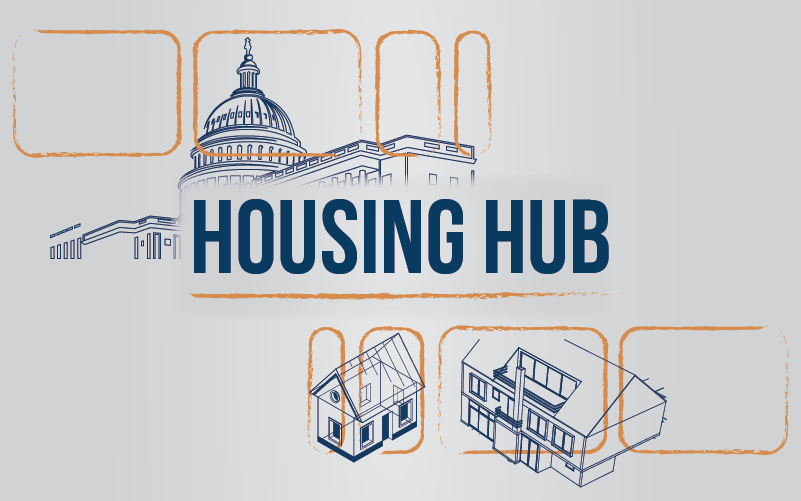National Advocacy Committee Blog: The Candidates and their Housing Plans
Celebrating NAHREP familia, cultura, politics, and grassroots action

Que onda mi gente?!
I almost spilled my drink a few weeks ago while I was watching the presidential debate. They actually talked about housing. And no, it wasn’t just, “let’s address homelessness” or “expand Section 8 housing,” they actually talked about HOMEOWNERSHIP and HOUSING SUPPLY.
Preach!
Needless to say I was excited. It got me thinking, how many of the candidates actually have housing plans? Where do they stand on the issue that is most important to our mission? How many of them have never said anything about housing? Because you know that’s telling in itself. How much thought each of them has given to how to address our nation’s housing affordability problems and how to expand homeownership opportunities for communities of color will shine light to the prioritization of these issues in their administrations. So, in the spirit of being politically savvy, here is what I dug up:
Here’s where the candidates stand on housing: (listed alphabetically)
Michael Bennet: Provides incentives to local government to reform zoning. Focused on housing inventory.
- Establish a one-time $10 billion competitive grant program for state and local governments that reform zoning laws in order to increase density.
- Increase funding for a transportation grant program called BUILD to $4.5 billion and make it eligible only to local governments that allow for more housing density near transportation hubs.
Joe Biden: He is the only top candidate to not have released any statements on housing/homeownership. Womp, womp. That’s a little concerning given that he’s leading in many of the polls!
Cory Booker: His plan is pretty comprehensive, addresses housing inventory, strengthening fair housing protections and this baby bond idea is pretty interesting!
- Ties more than $16 billion in federal block grant money—including Community Development Block Grants (CDBG)—to local governments that reform zoning.
- Advance fair housing among people of color who’ve historically faced discrimination.
- Establish “Baby Bonds” that could later be used for a down-payment for a house. This would be a federally funded savings account containing a $1000 bond for each new baby born in the U.S., with up to $2,000 in annual deposits depending on the income of the child’s family. The money would be invested in a low-risk fund managed by the Department of Treasury, and the child could have access to the money at age 18.
Pete Buttigieg: His program would most impact cities still experiencing blight such as Buffalo, Cleveland and Detroit.
- Would pass the 21st Century Community Homestead Act: The program would set up a pilot program where cities would establish a land bank to purchase and develop abandoned or foreclosed properties. A special-purpose trust (administered by HUD) would purchase those properties and provide funds for restoring them. Those eligible would be given the property to use as a primary residence—and after 10 years of making payments, the individuals living in these homes or “homesteaders” would own the property free and clear.
Julián Castro: He’s a former HUD Secretary Castro so it’s not surprising that he has a detailed housing plan. However, his plan leans more heavily on rentals and affordable subsidized housing but I’m pleased by his zoning reform emphasis.
- Would create a Presidential Commission on Zoning Reform to establish federal guidelines on land use and zoning.
- Expand CDBG and rural development programs by $2 billion per year and tie the money to zoning reforms.
- Three main housing initiatives would focus on: federally funded vouchers to help disadvantaged families pay their rent, creating a refundable tax credit for Americans whose rent exceeds 30% of their income and expanding the supply of affordable housing units.
Kamala Harris: BREAKING NEWS: she just dropped out. (Another one bites the dust!) Her program is pretty robust on addressing homeownership issues particular to communities of color. No mention of housing inventory issues though-surprising given her California roots. Oh well, her ideas were good.
- Would invest $100 billion into a HUD-administered grant program that provides assistance with down payments and closing costs for low- and middle-income borrowers who have lived in redlined neighborhoods for at least 10 years. To be eligible for the grants, a family’s annual income has to be less than $100,000, or less than $50,000 for an individual.
- Expand CDBG and rural development programs by $2 billion per year and tie the money to zoning reforms.
- Would change how credit scores are calculated to include rent payments, phone bills, and utilities so that people of color have more options for building strong credit and have a better chance of qualifying for a mortgage.
Amy Klobuchar: Touches a lot of key points important to NAHREP: zoning, CRA and credit scores. However, her plans are not very detailed on how she would do all of these things.
- Proposes “prioritizing” local governments that reform local zoning laws when allocating federal housing and infrastructure funds, but doesn’t specify which ones.
- Strengthen the Community Reinvestment Act (CRA).
- Reform how credit scores are calculated in order to include rent payments, phone bills, and utilities.
Bernie Sanders: His plan focuses on fair housing and discrimination with a strong emphasis on expanding affordable subsidized housing units and affordable rental properties.
- Would promote robust legal protections for fair housing and take steps to eliminate racial discrimination and gentrification.
- Housing for All plan where he emphasizes cost of living, building more affordable housing units and combating gentrification.
Tom Steyer: Steyer does not have a housing plan released as of today but he stated the following in the last debate on the need to build more housing:
Elizabeth Warren: Senator Warren has one of the most well thought out housing plans, true to her campaign mantra “I have a plan for that.” She addresses housing inventory, down payment assistance and housing discrimination.
- Would invest $10 billion into a new grant program that communities can use to build infrastructure, provided they reform land-use laws.
- Reinstate the Affirmatively Further Fair Housing (AFFH) rule that provides local governments tools to root out housing discrimination.
- Provide down payment grants to first-time homebuyers who live in areas that were previously redlined or officially segregated.
- Allocate $2 billion toward supporting people with negative equity on their mortgages caused by the financial crisis and it restructures the Community Reinvestment Act (CRA) of 1977—which requires banks to invest in the communities where they have branches—to give it stronger enforcement mechanisms.
Andrew Yang: Yang tweeted his support for “relaxing zoning laws” but provided no specifics on how he would do it. But hey, I guess it’s an acknowledgement that zoning is a problem which is better than nothing.
Lots of good stuff here. I’m happy many of the candidates are talking about the need to reform zoning to address our housing shortages. I wish they were talking about how Latinos are driving homeownership demand and more about how today’s immigration laws make construction labor shortage worse. Perhaps we need to speak up!
Have a great week mis corazones! I hope this helps as you’re making decisions on who to vote for. The first primary is held February 3, 2020 in Iowa.

About Noerena Limón
Noerena Limón is NAHREP’s Executive Vice President of Public Policy and Industry Relations. Noerena heads the organization’s policy and advocacy efforts on issues ranging from homeownership, housing inventory, credit access and immigration.
Prior to joining NAHREP, Noerena spent six years at the Consumer Financial Protection Bureau (CFPB) and served as a political appointee under President Obama in the White House Office of Political Affairs.



